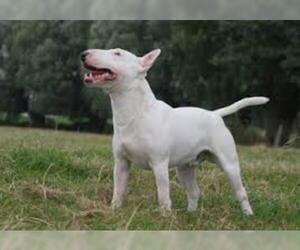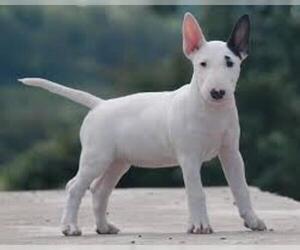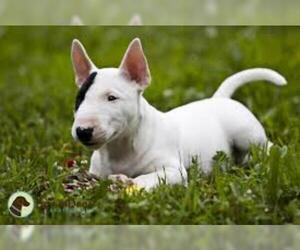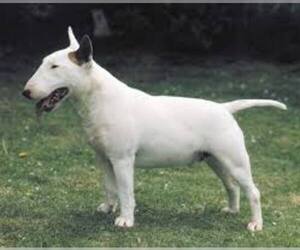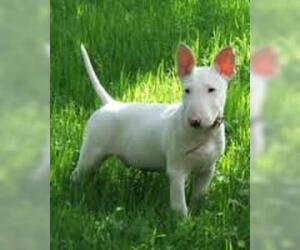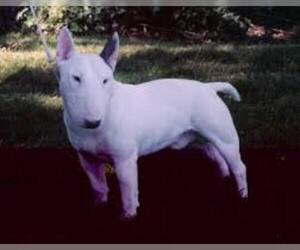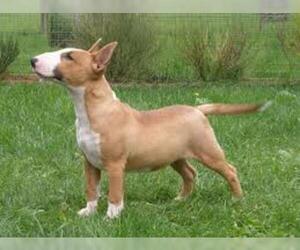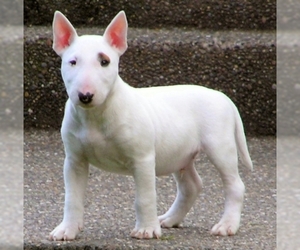
All about Miniature Bull Terrier dog breed
A.K.A. :Mini Bull, Mini BT, Minibull, Miniature Bullie, English Miniature Bull Terrier, MBT, Minibulls
Size
Grooming requirements
Exercise requirements
Good with other dogs
Watchdog ability
Energetic
Training requirements
Playful
Affectionate
Good with other pets
Good with children
Good with strangers
Winter
Summer
Healthiness
Protective
Life Span
| Pure Breeds | Member |
| Breeds A - Z | M |
| Breeds by Group | Terrier |
| Breeds by Trait | Good With Kids High Stamina Dog Breeds Low Shedding Smartest Dog Breeds |
| Overview: | The Miniature Bull Terrier, a captivating and spirited canine, originated in 19th-century England, developed from the larger Bull Terrier for rodent control and dog fighting, though its charming personality now shines in companion roles. Physically, they are sturdy and compact, characterized by their distinctive egg-shaped head and small, triangular eyes, giving them a perpetually alert expression. Their coat is short, flat, and hard, coming in a variety of colors including white, brindle, tricolor, and black. Temperamentally, Miniature Bull Terriers are known for being playful, energetic, and highly intelligent, often displaying a mischievous streak. While generally good with children and suitable for families who can provide ample socialization and training, their high energy levels and strong prey drive necessitate consistent guidance. They can adapt to apartment living if given sufficient exercise, but thrive with a fenced yard. Prospective owners should be aware of potential health concerns such as hereditary kidney disease, deafness, and patellar luxation, making responsible breeding and regular vet check-ups crucial for a long, healthy life with these endearing companions. |
F.A.Q.
All You Need to Know About the Miniature Bull Terrier Breed
The Miniature Bull Terrier, a smaller version of the standard Bull Terrier, originated in England and is known for its distinctive egg-shaped head and muscular build. These playful and energetic dogs possess a confident yet affectionate temperament, making them wonderful companions. While generally good with children, early socialization and training are crucial due to their spirited nature. Their compact size makes them surprisingly adaptable to apartment living, provided they receive adequate daily exercise to burn off energy. Grooming is minimal; a weekly brush suffices for their short, smooth coat. However, their strong prey drive means a secure, fenced yard is a must, and leash training is essential. Prospective owners should be aware of potential health concerns such as luxating patella, primary lens luxation, and deafness. The Miniature Bull Terrier thrives on human interaction and can be a devoted, entertaining family member for those prepared for their lively antics.Miniature Bull Terrier Weight: The average healthy weight for an adult Miniature Bull Terrier is typically between 25-33 pounds. While there isn't a significant weight difference between males and females, males may sometimes be at the higher end of this range. This is the healthy weight for Miniature Bull Terrier adults, ensuring they maintain their distinctive muscular build without being overweight or underweight. For those seeking a compact yet sturdy companion, understanding the Miniature Bull Terrier average size is key.
Wondering about the Miniature Bull Terrier height? These charming dogs are known for their sturdy build in a compact package! The average size of a Miniature Bull Terrier, measured at the shoulder, typically ranges from 10 to 14 inches. While there isn't a significant height difference between males and females in this breed, individual genetics can play a role, meaning some Miniature Bull Terriers may fall slightly outside this range. So, if you're asking "how tall is a Miniature Bull Terrier?", you can generally expect them to be around 10-14 inches at the shoulder as adults. This makes them a perfect medium-sized companion for many lifestyles!
The Miniature Bull Terrier comes in a vibrant range of colors, impacting both aesthetics and availability. AKC recognized Miniature Bull Terrier colors include white, often with colored markings on the head; brindle (red, black, or blue brindle); fawn (ranging from light to dark tan); red; black (often with tan or brindle points); and tri-color (black, white, and tan). Cream and sable are also accepted. These traditional Miniature Bull Terrier colors are what you'll typically find with reputable breeders and are considered standard for the breed.Beyond the standard, there are rare coat types and exotic Miniature Bull Terrier variations that are not accepted by major kennel clubs like the AKC and are often associated with health concerns or unethical breeding practices. These include blue Miniature Bull Terrier, lilac Miniature Bull Terrier, merle Miniature Bull Terrier, and chocolate Miniature Bull Terrier. While visually striking, these exotic Miniature Bull Terrier colors often command higher prices due to their rarity, but buyers should be aware that these colors are not breed-standard and may indicate genetic issues. When searching for Miniature Bull Terrier colors, always prioritize health and temperament over rare coat types, especially for those considering breeding or showing.
The Miniature Bull Terrier personality is often described as a spirited, playful, and affectionate companion. Known for their courageous and confident nature, they are also incredibly loving and devoted to their families, displaying strong loyalty. Their temperament of Miniature Bull Terrier generally includes a friendly disposition towards people, though early socialization is crucial for them to be well-adjusted and confident in various situations. While generally good-natured, their interactions with children should always be supervised, especially with younger children, due to their robust play style and strength. They can coexist with other pets, particularly if introduced and socialized from a young age, but their strong prey drive can sometimes be an issue with smaller, non-canine animals. Adaptable to apartment living, Miniature Bull Terriers do require consistent daily exercise and mental stimulation to prevent boredom and destructive behaviors. They thrive on human companionship and do not do well when left alone for extended periods.
Miniature Bull Terrier Temperament: A Spirited CompanionThe Miniature Bull Terrier temperament is a unique blend of playful exuberance and devoted loyalty. Known for their spirited and often comical nature, these dogs are friendly and outgoing, generally greeting new people with enthusiasm. They are highly sociable and thrive on human companionship, making them excellent companion dogs.Their loyalty to their family is unwavering, and they form strong bonds with their owners. While generally adaptable, their energetic nature means they require regular exercise. They can adapt to apartment living provided their exercise needs are met and they receive sufficient mental stimulation. Without it, they can become bored and potentially destructive.Regarding behavior with children, Miniature Bull Terriers can be wonderful playmates due to their robust build and playful spirit. However, due to their strength and occasional boisterousness, supervision is always recommended, especially with very young children, to ensure respectful interaction from both sides. Early socialization is key.When it comes to other pets, their predatory instincts can surface, particularly with smaller animals. While some can coexist peacefully with cats or other dogs, especially if raised together, careful introductions and supervision are crucial. They generally do best as the only dog or with a well-matched canine companion of the opposite sex.Miniature Bull Terriers do have a streak of stubbornness, a characteristic of many terrier breeds. Consistent training with positive reinforcement is essential from a young age. They are also surprisingly sensitive despite their tough exterior, responding best to gentle but firm guidance rather than harsh corrections. They crave attention and can be prone to separation anxiety if left alone for extended periods.Overall, the Miniature Bull Terrier is a charming, clownish, and devoted breed for owners who appreciate their unique personality traits and can provide the love, training, and activity they need.
Miniature Bull Terrier Care: Daily Maintenance & Health TipsMiniature Bull Terrier care is relatively straightforward. This low-energy dog breed requires moderate daily exercise – a good walk and playtime are usually sufficient. Due to their brachycephalic anatomy, avoid strenuous exercise in hot, humid weather to prevent overheating; they are climate-sensitive.Grooming is minimal; their short coat needs weekly brushing to remove loose hair. Regular nail trims are essential. Pay close attention to wrinkle and ear cleaning to prevent infections.Dietary considerations involve high-quality dog food appropriate for their life stage. Monitor their weight closely to prevent obesity, a common issue impacting joint health. Dental care is crucial: daily brushing and professional cleanings help prevent periodontal disease.Common health concerns include skin issues (allergies, hot spots), patellar luxation, and inherited heart conditions. Regular veterinary check-ups are key to early detection and management. How to care for a Miniature Bull Terrier also involves consistent training and socialization for a well-adjusted companion.
The Miniature Bull Terrier activity level is moderate, balancing enthusiastic bursts of energy with a love for lounging. These dogs are playful and robust, enjoying daily exercise needs that include at least 30-60 minutes of structured activity. This can involve brisk walks, vigorous playtime in a securely fenced yard, or engaging in dog sports like agility or obedience. They thrive on interactive play with their owners, enjoying games of fetch or tug-of-war.How active are Miniature Bull Terrier? While they have good stamina for their size, it's crucial to be mindful of their brachycephalic (short-nosed) anatomy. This makes them susceptible to overheating and breathing difficulties, especially in warm weather or during intense, prolonged exercise. Therefore, short, frequent play sessions are preferable to one long, strenuous outing. Always monitor their breathing and provide plenty of fresh water, ensuring exercise is limited during peak heat.Miniature Bull Terriers appreciate their downtime and are often content to relax by their owner's side after their exercise needs are met. They are suitable for active families who can commit to consistent daily exercise and mental stimulation, but also understand their need for rest. They are less suitable for extremely low-energy households that cannot provide regular opportunities for play and walks. Their intelligence and desire for companionship mean they benefit from training and interactive toys to prevent boredom.
Miniature Bull Terrier health problems stem from the breed’s compact, muscular build and distinctive head shape. Among the common Miniature Bull Terrier medical issues are primary lens luxation, which can lead to painful eye conditions and vision loss, and congenital sensorineural deafness, affecting up to 20% of the breed. Patellar luxation and hip dysplasia may also occur, causing joint instability and discomfort, especially in aging or overweight dogs. Their short coat and skin type make them prone to skin allergies, lethal acrodermatitis in rare cases, and skin fold infections if hygiene is neglected.
Although not classically brachycephalic, some Miniature Bull Terriers exhibit traits that contribute to Brachycephalic Obstructive Airway Syndrome (BOAS), including narrowed nostrils and elongated soft palates. Applying brachycephalic dog care strategies—such as avoiding heat, limiting strenuous activity, and using harnesses instead of collars—can help manage breathing stress. Their dense musculature and short muzzle also contribute to heat sensitivity, making hydration, shade, and rest breaks essential during warm weather or vigorous play. Spinal problems like laryngeal paralysis and disc degeneration may occur with age or poor conditioning.
Understanding how to keep Miniature Bull Terrier healthy involves regular veterinary checkups, genetic screening for breed-specific conditions, consistent grooming, weight control, and tailored exercise routines. With attentive care, Miniature Bull Terriers can enjoy a bold, affectionate life of 11–13 years.
Breed Breakdown: What Experts Say About the Miniature Bull Terrier
I'd rate the "Size" trait of the Miniature Bull Terrier as a 3.While not a tiny toy breed, they are distinctly a small-to-medium companion dog. Averaging around 10-14 inches tall and 18-28 pounds, their compact and muscular build is substantial for their height, but their overall footprint is significantly smaller than most medium breeds. They are larger and sturdier than a Chihuahua or a Yorkshire Terrier, but notably smaller and more manageable than a Labrador Retriever or a German Shepherd. This makes them an excellent choice for apartment living and travel, as they don't require vast amounts of space and are easily transportable. Their robust construction also means they aren't overly delicate despite their moderate size, suiting active households with space constraints.
I would rate the grooming requirements of the Miniature Bull Terrier at a 4 out of 10.This rating reflects that the breed is relatively easy to care for compared to many other companion dogs, though not entirely maintenance-free. Their short, smooth, and hard coat sheds moderately, requiring only weekly brushing to remove loose hair and keep it shiny. While they don't have extensive skin folds, owners should still be mindful of any moisture accumulation, especially around their ears and under their chin, to prevent irritation, though this isn't a daily or highly specialized task. Regular ear cleaning (typically weekly or bi-weekly), nail trimming (every 3-4 weeks), and occasional bathing (as needed, usually every 4-6 weeks) are standard for most dog breeds. While Miniature Bull Terriers can be susceptible to some skin allergies, this isn't a guaranteed high-maintenance factor for every individual and more about overall health management rather than a constant grooming requirement for the breed as a whole. They don't require professional grooming for haircuts or extensive coat maintenance, making them less demanding than long-haired or double-coated breeds.
I would rate the Miniature Bull Terrier's "Exercise Requirements" at a 7 out of 10.While not a hyperactive breed that demands hours of intense running, the Mini Bull Terrier is still a robust and energetic dog with a strong will and a history of working. They require more than just a quick walk around the block to truly thrive. Their daily activity recommendations lean towards at least 45-60 minutes of structured exercise, often broken into two sessions, supplemented by indoor playtime. They possess good energy levels and a decent tolerance for sustained movement, enjoying brisk walks, hiking, and interactive games. Their brachycephalic anatomy, while present, is generally less extreme than some other breeds, meaning they can handle more activity in moderate temperatures, but owners must always be vigilant for overheating. They are intelligent and strong-willed, meaning they benefit greatly from structured routines and mentally stimulating activities like obedience training, puzzle toys, and even beginner-level agility. Without adequate physical and mental stimulation, Mini Bulls can become bored, destructive, and even prone to behavioral issues. They certainly do not thrive with minimal activity and require consistent effort from their owners to ensure they are healthy, happy, and well-behaved companions.
I would rate the Miniature Bull Terrier's "Watchdog Ability" as a 6 out of 10.While not the most intimidating or naturally protective breed, the Miniature Bull Terrier is surprisingly alert and will definitely let you know if something is amiss. They tend to be very aware of their surroundings and possess a good sense of hearing. Their barking behavior isn't incessant, but they will definitely bark at unfamiliar sounds or people approaching their home. This isn't usually an aggressive, deep-chested bark, but more of a persistent, attention-getting alert. They have moderate territorial instincts – they aren't looking for a fight, but they do recognize their home as "theirs" and will typically respond to an intruder with a vocal warning. They are generally friendly with people once introduced, but their initial response to a stranger can be reserved and accompanied by their characteristic alert barks. They are more than just passive companions; they are capable of providing meaningful early warnings in a home environment due to their alertness and willingness to vocalize their concerns, though they are unlikely to physically deter a determined intruder beyond their initial noise.
I would rate the "Good with Other Dogs" trait of the Miniature Bull Terrier as a 3.While individual personalities vary greatly, the Miniature Bull Terrier, like its larger cousin, often possesses a strong prey drive and a historically-bred tendency towards dog aggression. They can be very dominant and assertive, especially towards unfamiliar dogs or those perceived as challenging. While some Miniature Bull Terriers can coexist peacefully in multi-dog households with careful socialization from a young age and consistent training, this is not a given and often requires significant effort. They are not a breed that generally thrives in spontaneously meeting and interacting with new dogs, and careful, controlled introductions are crucial. There's a higher potential for conflict, particularly with dogs of the same sex, and their high energy and strong will can make them challenging companions for more submissive or less confident canines. They generally require careful management in public spaces to avoid unwanted encounters.
I would rate the "Energetic" trait of the Miniature Bull Terrier as a 7 out of 10.Miniature Bull Terriers are a surprisingly robust and active breed, belying their sometimes stout appearance. They possess a good deal of stamina and a strong desire to play, making them a naturally energetic companion. They thrive on regular exercise, including brisk walks, vigorous playtime in a secure yard, and even some dog sports. Their intelligence also means they need mental stimulation to prevent boredom, which can manifest as destructive behavior. They are certainly not a "couch potato" breed and will happily join their owners on outdoor adventures.However, it's crucial to acknowledge the impact of their brachycephalic anatomy. While they have good energy, their shortened snouts can affect their ability to regulate body temperature and their endurance during intense or prolonged activity, especially in warm weather. Owners must be vigilant about overheating and avoid over-exertion, particularly during the hottest parts of the day. This brachycephalic trait prevents them from reaching the extreme, all-day energy levels of some other working or athletic breeds, as their exercise must be managed with greater care and awareness of their breathing. So, while they are definitely on the active side compared to many companion dogs, their physical limitations due to their flat face prevent them from being a true 9 or 10 in terms of sustained, unrestricted energy.
I'd rate the Miniature Bull Terrier's "Training Requirements" a 7.While intelligent, Miniature Bull Terriers are notoriously stubborn and possess an independent streak that can make training challenging. Their attention span, especially as puppies, can be short, and they may not always be highly responsive to commands without significant motivation and consistency. They absolutely require a consistent, firm, but fair approach, and positive reinforcement is highly effective, but owners need to be creative and patient to find what truly motivates their individual dog. This breed is generally not beginner-friendly and thrives with experienced handling and a well-structured routine from an early age. Owners must be prepared for a long-term commitment to training and socialization to ensure a well-behaved and happy Miniature Bull Terrier.
I'd rate the Miniature Bull Terrier's "Playful" trait a solid 8 out of 10.Miniature Bull Terriers are undoubtedly spirited and possess a zest for life that translates into high playfulness. They have a naturally high activity level and thrive on engagement. This breed absolutely loves games, especially those that involve chasing, tugging, and problem-solving, like puzzle toys. They are often quite attention-seeking and will actively solicit interaction from their humans, using nudges, vocalizations, or bringing toys. Their response to toys is usually immediate and enthusiastic, and playtime is a key component of their daily happiness. While not quite the relentless, always-on energy of some working breeds, they are far from laid-back and require consistent mental and physical stimulation to prevent boredom. Their overall enthusiasm in daily life is palpable; they approach most situations with an eager and curious disposition, making them very fun-loving companions.
I'd rate the "Affectionate" trait of the Miniature Bull Terrier a strong 9 out of 10.Miniature Bull Terriers are incredibly loving and people-oriented dogs, often referred to as "velcro dogs" due to their intense desire for human companionship. They thrive on affection and are not independent in the slightest when it comes to their family. They will actively seek out physical closeness, often attempting to be lap dogs despite their sturdy build, and are known for their enthusiastic cuddles. Their loyalty to their owners is unwavering, and they are surprisingly sensitive to owner emotions, often trying to comfort or engage when they sense distress. This breed has a strong tendency to follow family members from room to room, preferring to be in the same space as their loved ones at all times. They truly consider themselves part of the family and aim to be involved in every activity, making them extremely devoted and affectionate companions.
I would rate the "Good with Other Pets" trait of the Miniature Bull Terrier as a 3 out of 10.While not impossible, Miniature Bull Terriers are generally highly incompatible with other pets, especially other dogs and cats. They possess a strong prey drive, a common characteristic of terrier breeds, which can lead them to view smaller animals as game. Furthermore, they can be prone to resource guarding with food, toys, and even their human companions, leading to conflict with other pets. While early and consistent socialization from puppyhood is crucial and can help somewhat, it's often not enough to override their inherent tendencies. They often require significant management, strict supervision, and a highly structured environment to coexist peacefully, and even then, incidents can occur. They are generally not naturally sociable with other animals and are best suited for single-pet households or with owners experienced in managing a strong-willed, high-prey-drive breed in a multi-pet setting.
The Miniature Bull Terrier rates a 5 out of 10 for "Good with Children." While generally playful and energetic, making them fun companions for older, more respectful children, their robust nature and tendency for boisterous play can be overwhelming for very young children. They possess a stubborn streak and a strong prey drive, which means they require consistent training and firm, positive guidance to ensure they understand boundaries and behave appropriately around kids. They are not naturally as gentle and patient as some other breeds, and their tolerance for noise and sometimes clumsy handling from young children can be limited. Supervision is always recommended, especially with younger children, to ensure both the dog and the child's safety and well-being. They can thrive in a family setting with children, but it requires dedicated effort from the owners in terms of socialization, training, and managing interactions.
The Miniature Bull Terrier rates a 7 for "Good with Strangers." This breed is typically quite outgoing and friendly with new people, often displaying a cheerful and confident demeanor. They are generally not reserved and will readily approach for attention, enjoying the company of unfamiliar adults. While they possess a protective instinct towards their family and home, which might lead to an initial "watchdog" bark, they quickly transition to a welcoming attitude once they perceive no threat. They are adaptable in public and guest-filled environments, often thriving on the social interaction. While natural socialization during puppyhood is always beneficial for any breed, Miniature Bull Terriers are generally predisposed to being comfortable and engaging with strangers rather than requiring extensive training to overcome shyness or unfriendliness. However, their strong-willed nature means consistent, positive interactions from a young age will solidify their naturally amiable temperament.
Rating: 3The Miniature Bull Terrier rates a 3 for winter tolerance, indicating significant sensitivity to cold. Their short, single coat provides minimal insulation, and while they possess a sturdy build, their body fat isn't sufficient to counteract prolonged exposure to low temperatures. Their smaller size also contributes to a faster heat loss compared to larger breeds. Although not as severely brachycephalic as some other breeds, their relatively short muzzle can still make breathing in very cold air uncomfortable or potentially problematic during strenuous exercise. They are at a heightened risk of hypothermia if left exposed to cold conditions without adequate protection. This breed absolutely requires special care during winter months, including warm clothing (sweaters or coats) for even short outdoor excursions, and limited time outdoors in freezing temperatures. They are not suited for prolonged outdoor activity in cold climates and should be primarily indoor dogs during winter.
I would rate the Miniature Bull Terrier's "Summer" tolerance at a 3. Miniature Bull Terriers, while not as severely brachycephalic as some other breeds, do possess a shortened snout, which significantly impacts their ability to cool themselves effectively. This anatomical feature, combined with their generally active nature, makes them highly susceptible to overheating. They struggle to regulate their body temperature in warm weather, putting them at a high risk of heatstroke, even during moderate temperatures or with minimal exertion. Consequently, they require substantial special care in summer months compared to other companion dogs. Outdoor activities should be limited to the coolest parts of the day (early morning or late evening), and even then, only for short durations. Access to air conditioning or other climate-controlled environments is essential during hot weather, and they should never be left unsupervised outdoors or in a car, even for a few minutes.
I would rate the Miniature Bull Terrier's "Healthiness" trait as a 5 out of 10.While not as plagued by health issues as some extremely brachycephalic or giant breeds, the Miniature Bull Terrier is by no means an exceptionally robust or low-maintenance dog from a health perspective. They are prone to a significant number of genetic conditions that, without responsible breeding and preventive care, can lead to serious and chronic problems.Their most notable health concerns include primary lens luxation (PLL), which can lead to blindness and is testable; kidney disease (polycystic kidney disease - PKD, and hereditary nephritis); heart disease (mitral valve disease, subaortic stenosis); and a variety of skin conditions, including zinc-responsive dermatosis and allergies. Deafness (often unilateral) is also a concern, particularly in white dogs. Patellar luxation, while not as prevalent as in some small breeds, can also occur. Their life expectancy is generally in the 11-14 year range, which is average for a dog of their size, but the quality of that life can be significantly impacted by these predispositions.Compared to other companion dogs, they are definitely considered high-maintenance in terms of health monitoring and potential vet visits. Responsible breeders diligently screen their breeding stock for PLL, kidney, and heart conditions, which significantly reduces the incidence of these diseases in their puppies. However, even with diligent breeding, the genetic pool still carries these predispositions, and owners must be vigilant about symptoms and proactive with veterinary care. They are not a "generally robust" breed; instead, they require informed and committed owners to manage their health proactively.
I would rate the "Protective" trait of the Miniature Bull Terrier as a 6 out of 10.While Miniature Bull Terriers are incredibly loyal to their owners and possess a strong territorial instinct, their protective nature leans more towards being an excellent alert system rather than a physically imposing guard dog. They are highly alert and will certainly let you know if a stranger is approaching or something is amiss with their distinctive "watchdog bark." Their courage is undeniable, and they will likely stand their ground if they perceive a threat to their family. However, their often friendly and even clownish demeanor, combined with their moderate size, means they are more likely to deter an intruder through noise and presence rather than through aggressive action. They are typically good with strangers once introduced and deemed non-threatening by their owners, and their primary role is unequivocally that of a devoted companion dog. While they *could* offer some level of meaningful protection in a household setting, it would be more in the vein of a vocal deterrent and a fiercely loyal presence, rather than a breed bred for serious defensive work.
I would rate the "Life Span" trait of the Miniature Bull Terrier breed a 6 out of 10.While not considered exceptionally long-lived, their average lifespan of 10-12 years places them squarely in the average range for most companion dog breeds. They don't typically suffer from a multitude of life-shortening genetic diseases that plague some other breeds, but common issues like kidney disease, heart problems (especially mitral valve disease), and patellar luxation can impact their longevity. Responsible breeding practices focusing on genetic testing to minimize these predispositions, coupled with excellent veterinary care and a healthy lifestyle, can significantly contribute to a Miniature Bull Terrier reaching the higher end of their life expectancy. They aren't notably short-lived, nor are they known for exceptional longevity compared to other companion dogs.
Miniature Bull Terrier Dogs for adoptionSee all dogs for adoption
Miniature Bull Terrier BreedersSee all breeders
Similar Dog Breeds for Miniature Bull Terrier
Breed Mixes of Miniature Bull Terrier
Quick Breed Selector 0 - not important, 1 - smallest, 10 - largest
Variants & Mistakes :Miniature Bullterrier, Mini Bull Terrier, Mini Bullterrier, Minature Bull Terrier, Miniture Bull Terrier, Miniature Bull Terier, Minature Bull Terier, Miniture Bull Terier, Miniature Bul Terrier, Minature Bul Terrier, Miniture Bul Terrier, Miniature Buhl Terrier, Minature Buhl Terrier, Miniture Buhl Terrier, Miniature Bulterrier, Minature Bulterrier, Miniture Bulterrier, Miniature Buhlterrier, Minature Buhlterrier, Miniture Buhlterrier, Miniatr Bull Terrier, Minitaur Bull Terrier, Minature Bullterrier, Miniatur Bull Terrier, Miniature Bull Terryer, Minature Bull Terryer, Miniture Bull Terryer, Minature Bull Terrior, Miniture Bull Terrior, Miniature Bul Terrior, Minature Bul Terrior, Miniture Bul Terrior, Miniature Bul Terier, Minature Bul Terier, Miniture Bul Terier, Mini Bull Terror, Minature Bull Terror, Miniture Bull Terror, Miniature Bull Terrior, Miniatrue Bull Terrier, Minieture Bull Terrier, Minniature Bull Terrier, Miniatuer Bull Terrier, Miniture Bullterrrier, Minature Bullterrrier, Miniatrue Bullterrier, Minieture Bullterrier, Minniature Bullterrier, Miniatuer Bullterrier
